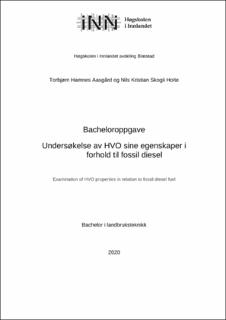Undersøkelse av HVO sine egenskaper i forhold til fossil diesel
Bachelor thesis
Permanent lenke
https://hdl.handle.net/11250/2661452Utgivelsesdato
2020Metadata
Vis full innførselSammendrag
Denne oppgaven handler i hovedsak om hvordan ulike drivstoff påvirker motorene i landbruksmaskiner. Den inneholder en del teori og bakgrunnsinformasjon som skal gi leseren evnen til å forstå sammenhengen i forsøkene og resultatene som foreligger. Klimaproblematikken er også å finne som en rød tråd gjennom oppgaven, da biodiesel, eller HVO, er et av nøkkelordene. Oppgaven gir et innblikk i forbrenningsmotorenes oppbygning og virkemåte, samtidig som den tar for seg hvilke egenskaper ulike drivstoff har. Andre oppgaver og forsøk med tilhørende resultater blir brukt som teori og bakgrunnsstoff for arbeidet som utføres i denne oppgaven. HVO, som er et fornybart drivstoff, kan være nøkkelen til å gjennomføre et betraktelig kutt i utslipp av klimagasser i Norge. I den forbindelse er det interessant å finne ut om denne dieselens egenskaper egner seg for bruk på landbruksmaskiner. Det er derfor gjennomført et stort prosjekt med nettopp dette i fokus. Prosjektet testet en mengde traktorer av ulike fabrikater og størrelser, der data for dieselforbruk, timetall og oljeprøver ble innhentet. Disse dataene blir nærmere undersøkt i denne oppgaven for å se på sammenhenger mellom drivstoff, og for å til slutt avveie om HVO er en fullgod erstatning for fossil diesel. Vi undersøker altså HVO sine egenskaper i forhold til fossil diesel i en dieselmotor, og her ser vi på oljeanalyser og eget forsøk. Oljeanalysene viser at motorene klarer seg godt med det nye drivstoffet, med tanke på både smøreegenskaper og drivstoffinnhold i oljen. For vårt eget traktorforsøk på skolens Volvo BM 430 er det små forskjeller også der med tanke på drivstoffutnyttelsen. Med dette grunnlaget mener vi at HVO nå er blitt et godt alternativ til å erstatte fossil diesel. Utfordringen nå er å lage nok drivstoff til å svare på etterspørselen, med en akseptabel pris og på en miljøvennlig og bærekraftig måte. This thesis is mainly focusing on how different diesel fuels affect the engines in agricultural machinery. It builds up with theory and background information, which will give the reader the ability to see the connections regarding the trials and results. The climatic challenges we face are imbedded as a red line throughout the thesis, as biodiesel, or HVO, is one of the key words. The thesis gives an insight into the combustion engine and how it`s built up, as well as how it functions with different diesel fuels. Other thesis’s and trials, along with its results, are used as theory and as a background for the work that is done in this thesis. HVO, which is a renewable fuel, may be the key to cut emissions in Norway. Therefore, it is interesting to see if this diesel fuel has the qualities needed to be used on agricultural equipment. Studies have been done with a focus on this topic. One of them tested tractors from different manufacturers and of different sizes, where data regarding fuel consumption, workhours and oil samples where gathered. This data will be examined further in this thesis to see if there are any similarities between the different diesel fuels, and to conclude whether HVO is an adequate replacement to conventional diesel fuel. We are examining HVO properties compared to fossil diesel fuel in diesel engines, and we are examining test results from oil samples and our own trials. The oil analysis shows that the engines are working well with the new HVO fuel, with regards to lubricity and fuel content in the oil itself. In our own trial with the Volvo BM 430 tractor, owned by the school, we see the same trends for fuel efficiency. Considering these results, we conclude that HVO is a good substitute for fossil diesel fuel. The mission now is to make more of the renewable fuel with an acceptable price tag, and in an environmentally friendly and sustainable way.
